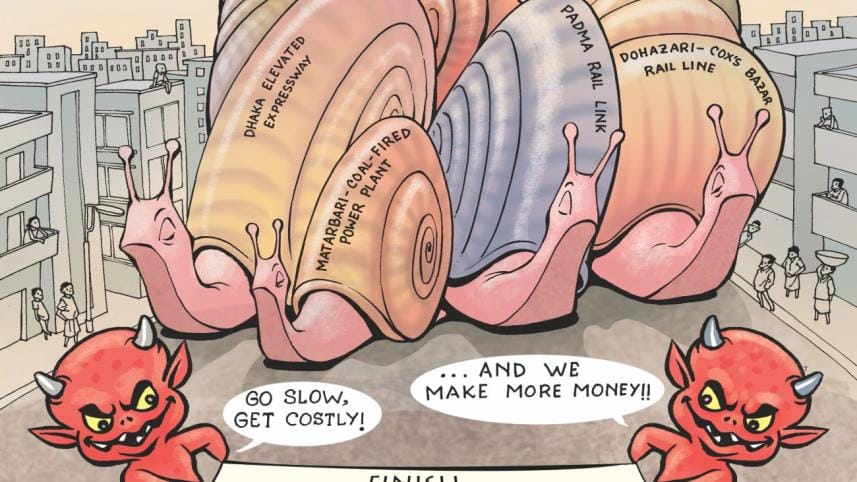No prescription for 'slow' virus

Fast-track projects, as the title suggests, are supposed to be implemented at breakneck speed because they boost economic activities once they are complete.
But in Bangladesh, they are done at a snail's pace. Inefficiency, corruption, and negligence of project officials plague implementations.
Officials of ministries concerned also delay implementation of projects so that the cost of the projects increases "as well as their commissions or cuts" and contractors are never in a hurry since escalation of costs benefits them too. The bidders do not appoint necessary manpower to expedite the work, experts and insiders said.
The result: project implementing entities failing to achieve target implementation.
Even project directors have no intention to implement the project fast or ensure quality of work as they have no reward and punishment for it. They just carry out their responsibilities like any other government official.
Project directors are not efficient or firm in dealing with contractors to ensure timely implementation and the government has to spend more due to the negligence and inefficiency of project officials.
From the recent assessment of the Centre for Policy Dialogue (CPD), one might conclude that the overall progress of the "fast-track" projects failed to reach their targets.
The sluggish pace has made the distinction between fast-track projects and other projects rather unclear.
Five of the nine fast-track projects have made visible progress but are behind schedule. The rest three are way behind but one, Dhaka metro rail project (MRT-6), is expected to be done ahead of time.
As per prime minister's interest, six mega projects were included as fast-track projects in 2014. Later, four more projects were included.
Even a fast-track project monitoring committee, led by Prime Minister Sheikh Hasina, was formed to keep pressure on the ministries to finish the work on time. But that seems to be having no effect.
The government has allocated Tk 32,555 crore for mega projects under the next fiscal year's Annual Development Programme (ADP) to speed up the implementation of the projects ahead of the next national polls.
Eight of the nine projects had got an allocation of Tk 30,929 crore in the budget for fiscal year 2017-18.
Most of the projects were a good few years behind schedule, including the flagship Padma Bridge project.
The government had originally planned to inaugurate the Padma Bridge by the end of this year, but as of April, only 53.6 percent of the project had been completed.
Finance Minister AMA Muhith in his budget speech said implementation of the mega projects would uphold the image of the country globally. Half the work of the Padma Bridge project was done, including successful installation of four spans.
The project cost, however, increased twice and was raised to Tk 28,793 crore from the last revised amount of Tk 20,507 crore. "There is no accountability or any penalty for the project implementing entities, so the implementation is going at slow speed," said AB Mirza Azizul Islam, a former adviser to a caretaker government.
The officials tasked with implementing the important projects did not have the right credentials for such high-profile work, said Ahsan H Mansur, executive director of the Policy Research Institute.
"They do not have experience in project management," he added.
Fast-track projects are actually being implemented like regular projects, like the ones under the Annual Development Programme, said Mustafizur Rahman, distinguished fellow of the Centre for Policy Dialogue.
He went on to place the blame squarely on the monitoring committee.
"The committee just collects a monthly progress report from the Economic Relations Division and that's it. There is no close monitoring of the implementation work."
Because of the massive delays, the government would now have to spend more on the projects, said Mustafizur.
"If the government had to spend an additional 10 percent, it would be Tk 26,000 crore, which is close to the original cost of the Padma Bridge."
However, Md Abul Kalam Azad, principal coordinator of sustainable development goals (SDG) at the Prime Minister's Office, insisted that almost all the project implementation work was going on smoothly.
Asked about the delays, he declined to make any comment. "The government is trying to implement the projects speedily," he added.
Among the nine fast-track projects, metro rail is exceptional.
The implementation of Dhaka Mass Rapid Transport Development Project was delayed for six months after the departure of Japanese experts due to the militant attack in Gulshan café in July 2016.
The government managed the situation well and decided to quicken its implementation and reschedule the deadline to 2020, instead of the original 2022. About 14.9 percent progress had already been achieved, which is a very good sign.




 For all latest news, follow The Daily Star's Google News channel.
For all latest news, follow The Daily Star's Google News channel.
Comments